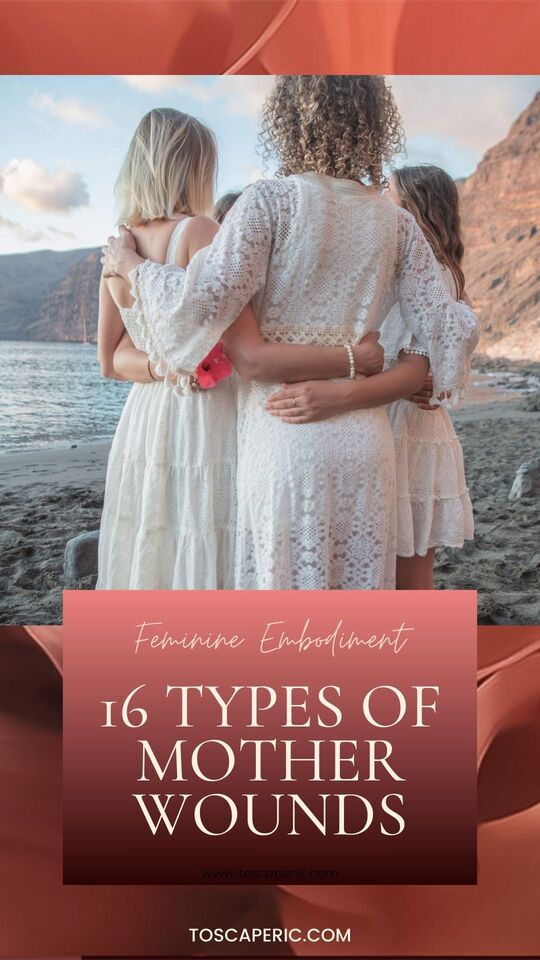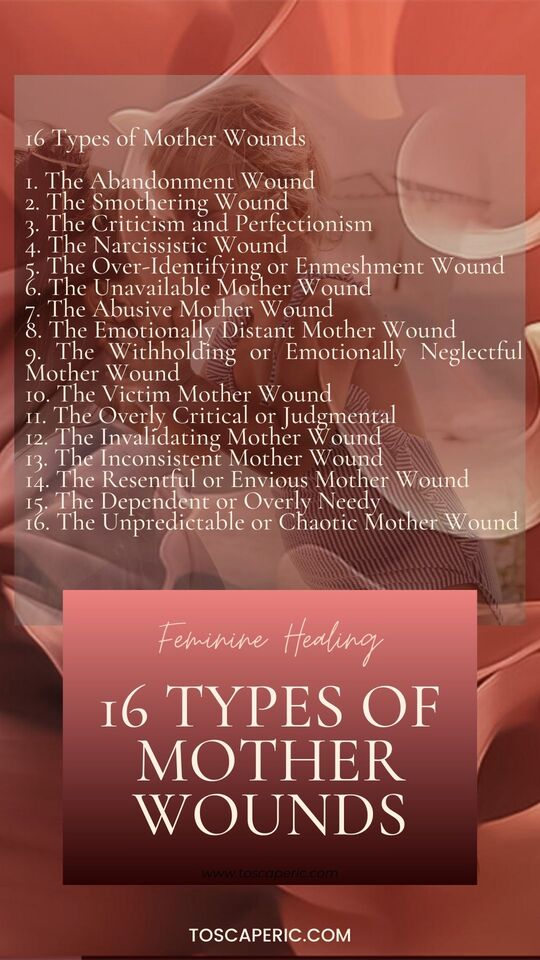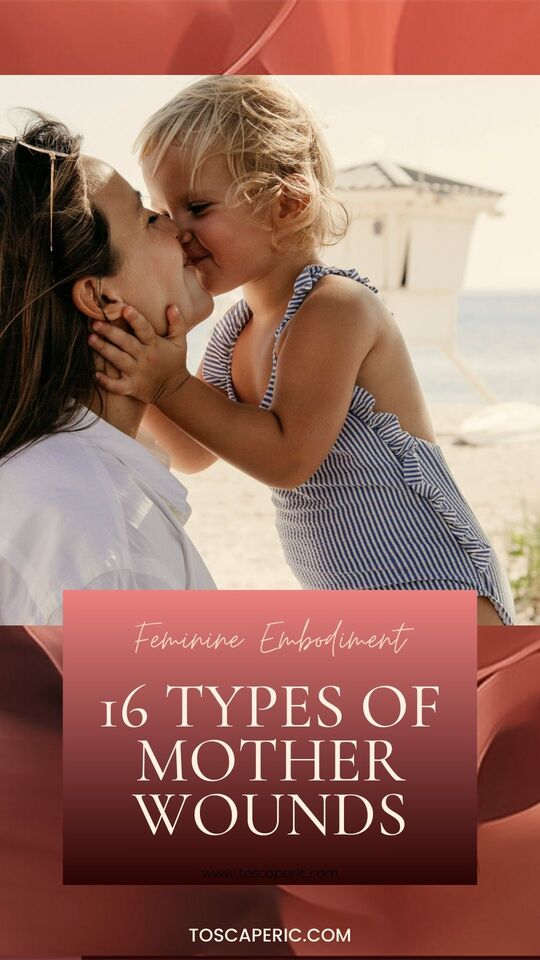I am Tosca
Welcome Goddess!
The mother wound refers to the emotional, psychological, or physical scars left by a mother’s behavior, whether intentional or unintentional. This wound can take many forms, depending on how the mother’s actions—or lack of actions—impacted her child. These wounds often get passed down through generations and affect a person’s emotional well-being, relationships, and sense of self-worth. Below are some of the common types of mother wounds, each with its unique set of challenges and implications.
1. The Abandonment Wound
The abandonment wound occurs when a child’s emotional, physical, or psychological needs are not met by their mother. This can happen through physical absence, emotional neglect, or inconsistent caregiving. Children who experience abandonment may grow up feeling unloved, unsupported, and disconnected. As adults, they may struggle with feelings of loneliness, fear of rejection, and difficulty trusting others.
- Characteristics: A deep sense of loneliness, fear of being left behind, feeling unworthy of love or care, difficulty forming close relationships.
- Healing Process: Healing from this wound requires learning to trust oneself and others, nurturing self-love, and establishing healthy emotional boundaries. Therapy, self-reflection, and self-compassion are crucial in overcoming feelings of abandonment.
2. The Smothering Wound
Smothering, or overprotection, is a mother wound that arises when a mother is overly involved or controlling in her child’s life, stifling their independence and personal growth. This can manifest as a lack of boundaries, constant overbearing attention, or a refusal to allow the child to develop their own identity and autonomy. As adults, individuals with this wound may struggle with boundaries, feel suffocated in relationships, or lack a clear sense of self.
- Characteristics: Feeling stifled or unable to make independent choices, struggling with boundaries in relationships, difficulty asserting oneself, an over-reliance on others for validation.
- Healing Process: Healing from the smothering wound involves learning to set healthy boundaries, develop independence, and trust in one’s own decision-making abilities. It’s important to embrace the freedom of self-expression and identity outside of parental expectations.
3. The Criticism and Perfectionism Types of Mother Wounds
This wound develops when a mother is highly critical, demanding, or perfectionistic, creating an environment where the child feels like they must constantly meet high, often unrealistic, standards. This type of wound can result in feelings of inadequacy, chronic self-doubt, and a fear of failure. As an adult, the individual may struggle with perfectionism, self-criticism, and feelings of not being “good enough,” which can lead to burnout, anxiety, and low self-esteem.
- Characteristics: Fear of making mistakes, chronic perfectionism, a deep sense of unworthiness, low self-esteem, a tendency to be overly self-critical.
- Healing Process: Healing this wound requires learning to accept imperfections, developing self-compassion, and challenging negative internalized beliefs about worth. Reconnecting with a nurturing, supportive inner voice can help counter the harsh criticism learned from a mother figure.
4. The Narcissistic Wound
When a mother is narcissistic, emotionally unavailable, or self-centered, the child’s emotional needs often go unmet. Narcissistic mothers may manipulate, gaslight, or invalidate their children’s feelings, making them feel insignificant or invisible. This type of wound can lead to feelings of emotional emptiness, self-doubt, and a struggle for validation in adulthood. Children of narcissistic mothers may grow up feeling like they don’t matter unless they are meeting the needs of others.
- Characteristics: Feelings of emotional neglect, an inability to feel heard or seen, chronic self-doubt, struggling with identity, seeking approval or validation from others, feeling like a “people pleaser.”
- Healing Process: Healing from a narcissistic mother wound involves learning to validate oneself, setting healthy boundaries, and cultivating self-worth that is not dependent on external validation. Therapy or coaching can help reframe deeply ingrained beliefs about self-worth and reclaim one’s true identity.
5. The Over-Identifying or Enmeshment Wound
Enmeshment occurs when a mother becomes overly involved in her child’s life, often to the point of losing boundaries between herself and her child. This can lead to an unhealthy emotional bond, where the child feels responsible for the mother’s emotional well-being, or where the child’s sense of self is overshadowed by the mother’s identity. Enmeshment can hinder the child’s development of autonomy and may result in confusion over personal identity or emotional dependence.
- Characteristics: Difficulty distinguishing between your feelings and your mother’s, feeling overly responsible for your mother’s emotions, inability to make decisions without approval, struggles with personal boundaries.
- Healing Process: Healing from enmeshment involves creating healthy boundaries, reconnecting with one’s sense of self, and learning to detach emotionally from the mother’s needs. Therapy can assist in untangling these complex emotional dynamics.
6. The Unavailable Mother Wound
An emotionally unavailable mother is one who is either physically absent or emotionally distant, leaving her child feeling unsupported or unseen. The lack of warmth and nurturing can create a deep sense of emotional neglect that can impact a person’s ability to feel loved or secure in relationships as an adult. This wound can also manifest as a fear of being vulnerable or rejected, making it difficult to trust others.
- Characteristics: Difficulty expressing emotions, fear of vulnerability, a sense of being alone even when around others, difficulty trusting in relationships.
- Healing Process: To heal this wound, it is essential to create emotional safety within oneself and develop trust in others. Therapy can be crucial in exploring the roots of emotional neglect and learning to build secure, healthy relationships.
7. The Abusive Mother Wound
This wound is formed when a mother is physically, emotionally, or verbally abusive. The child may experience constant criticism, verbal assault, or even physical harm, leading to long-lasting psychological damage. This can leave deep scars of shame, fear, and insecurity, making it difficult for individuals to feel safe or worthy of love. The effects of this wound are profound, as it can shape a person’s worldview, self-image, and future relationships.
- Characteristics: Chronic shame, fear, and insecurity, difficulty trusting others, self-destructive behaviors, anger management issues, fear of confrontation, low self-esteem.
- Healing Process: Healing from abuse requires confronting the trauma, acknowledging the pain, and working through the complex emotions of betrayal and hurt. Therapy and trauma-informed care are essential for processing abuse and rebuilding a healthier self-image.
Join The Letting Go Club
12 Month Journey of Feminine Embodiment, Self-love, Sisterhood, Letting Go & Musings

Reclaim your energy. Reclaim your power. Embrace your feminine flow. Sign up here.
8. The Emotionally Distant Mother Wound
Emotionally distant mothers tend to be disengaged from their children’s emotional needs, either because they have not learned how to nurture or because they are too overwhelmed with their own issues. This leaves the child feeling emotionally starved, unsure of how to connect with others, and unable to fully express their emotions. The emotionally distant mother wound can lead to feelings of isolation and difficulty in forming deep, trusting relationships.
- Characteristics: Emotional isolation, fear of emotional expression, difficulty trusting or forming intimate relationships, an inability to connect emotionally with others.
- Healing Process: Healing from this wound involves learning to open up emotionally, allowing vulnerability, and building emotional intimacy with others. It’s also important to learn how to nurture oneself emotionally and create fulfilling connections.
9. The Withholding or Emotionally Neglectful Mother Wound
This type of mother wound stems from a mother who withholds affection, love, or nurturing from her child, either intentionally or unintentionally. The withholding can manifest in subtle ways, such as being emotionally unavailable, not providing comfort during times of distress, or failing to validate the child’s emotional experiences. The child may feel like they must earn love or affection, leading to an adult who struggles with feelings of inadequacy or a constant need for external validation.
- Characteristics: A deep sense of not being “enough,” feelings of emotional emptiness, an inability to express or understand emotions, fear of rejection or abandonment.
- Healing Process: Healing from this wound involves learning to nurture and validate yourself emotionally. It’s important to embrace self-love and work on recognizing your inherent worth, separate from others’ affection or approval.
10. The Victim Mother Wound
In some cases, a mother may present herself as a victim of circumstances, constantly expressing helplessness, self-pity, or an inability to take responsibility for her actions. This behavior can place undue emotional burdens on the child, who may feel responsible for taking care of the mother or for solving her problems. The child may grow up feeling overwhelmed, excessively responsible, or unable to prioritize their own needs.
- Characteristics: Overwhelming guilt, taking on excessive responsibility, feeling burdened or emotionally drained, struggling with codependency.
- Healing Process: Healing this wound involves setting healthy boundaries, learning to prioritize your own emotional and mental well-being, and disengaging from the need to “save” others, particularly the mother. Developing a clear sense of responsibility for your own life, not others, is key.
11. The Overly Critical or Judgmental Types of Mother Wounds
When a mother is hypercritical, judgmental, or excessively focused on perfection, she may inadvertently teach her child to focus on flaws and shortcomings. The child might develop a tendency to scrutinize their own every move, leading to chronic self-criticism, feelings of shame, or a constant drive to achieve unattainable standards. This can severely affect self-esteem, confidence, and the ability to feel proud of accomplishments.
- Characteristics: Chronic self-criticism, fear of failure, difficulty feeling proud of achievements, perfectionism, anxiety about being judged or criticized by others.
- Healing Process: To heal this wound, you need to develop self-compassion and challenge the perfectionist beliefs instilled by your mother. Reframing your inner dialogue and learning to embrace imperfections as part of being human is vital to healing.

If you’re enjoying this, subscribe to my self-love letters for free.
12. The Invalidating Mother Wound
This wound occurs when a mother dismisses, minimizes, or invalidates her child’s emotions or experiences. The child may express fear, sadness, or excitement, only to have their feelings dismissed or belittled by the mother. This teaches the child that their feelings are unimportant or that they should suppress their emotions in order to be accepted. As an adult, this can lead to a disconnection from one’s emotional world, difficulty identifying or expressing feelings, and an inability to trust one’s own emotional responses.
- Characteristics: Difficulty identifying emotions, fear of being judged for expressing emotions, emotional numbness, invalidation of self and others.
- Healing Process: Healing involves learning to honor your emotions, give yourself permission to feel, and trusting your emotional responses. It also helps to engage in therapy to work through any dismissive behaviors or beliefs internalized from childhood.
13. The Inconsistent Mother Wound
Inconsistency from a mother can create a sense of unpredictability and emotional insecurity in a child’s life. When a mother’s affection, care, and attention are erratic or unreliable, the child grows up with the constant fear of being abandoned or unloved. This inconsistency can cause emotional confusion, leaving the individual unsure of how to expect love and affection from others. As an adult, the person may become hyper-vigilant or insecure in relationships, constantly questioning the reliability and depth of their connections.
- Characteristics: Fear of abandonment, emotional insecurity, difficulty trusting people, emotional instability, anxiety in relationships.
- Healing Process: Healing requires creating stability within oneself and learning to rely on personal emotional resources rather than seeking reassurance from others. Building trust in relationships and creating boundaries is essential for healing from this wound.
14. The Resentful or Envious Mother Wound
A resentful or envious mother may harbor feelings of jealousy toward her child, either because of the child’s success, beauty, or the mother’s own unhealed wounds. In some cases, the mother may project her dissatisfaction with herself onto her child, withholding affection or creating competition. This can lead to feelings of guilt, shame, or self-doubt in the child. The child may subconsciously feel responsible for the mother’s unhappiness and may grow up with a distorted sense of self-worth.
- Characteristics: Guilt about one’s own success, difficulty accepting compliments, feelings of shame or not deserving happiness, striving for approval in relationships, competitive dynamics with the mother.
- Healing Process: Healing involves recognizing that you are not responsible for your mother’s emotions and learning to accept your own success and happiness. Developing a healthy sense of pride in yourself and setting boundaries around envious or critical behavior is essential.
15. The Dependent or Overly Needy Types of Mother Wound
In this type of wound, a mother is overly dependent on her child for emotional or physical support, often to an unhealthy extent. This creates an environment where the child feels obligated to care for the mother, often sacrificing their own needs in the process. Over time, this can lead to difficulties in setting boundaries, difficulty distinguishing one’s own needs from others’, and a tendency to overextend oneself for others’ emotional well-being.
- Characteristics: Difficulty saying no, a sense of guilt or obligation to care for others, self-sacrifice, inability to distinguish personal boundaries, codependency can be a sign of the overly needy mother wound.
- Healing Process: Healing from this wound requires learning to prioritize your own needs, develop healthy boundaries, and allow space for your own emotional autonomy. Therapy or support groups focused on codependency can be helpful in breaking this cycle.
16. The Unpredictable or Chaotic Mother Wound
A mother who is emotionally volatile or chaotic can create an unstable environment for her child. The child may never know what to expect from the mother—one moment she might be loving and nurturing, and the next she might be angry or distant. This unpredictability can lead to a deep sense of insecurity and a fear of emotional unpredictability in future relationships. As adults, individuals may develop anxiety, a need for control, or an inability to trust their own emotions.
- Characteristics: Anxiety, fear of emotional instability, a deep need for control, difficulty trusting others, self-doubt.
- Healing Process: Healing involves learning to create emotional stability within yourself and embracing the unpredictability of life with a sense of acceptance. It’s important to work through feelings of insecurity and learn to trust others in relationships.



Conclusion
The different types of mother wounds reflect the complex nature of mother-child relationships and the varied ways in which maternal behavior can impact emotional development. Healing from these wounds is a deeply personal and transformative process, one that involves recognizing and acknowledging the pain, challenging the negative patterns, and rebuilding a healthy, nurturing relationship with oneself. Through therapy, self-reflection, and cultivating compassion, individuals can begin to heal the wounds created by their mothers and move toward a future of emotional health and well-being. Stay tuned for the father wound series on the journal.
Family dynamics often shape two types of children: those who unconsciously repeat the cycles of pain, dysfunction, and unresolved trauma, and those who courageously choose to break free and heal.
Repeating the cycle often stems from a lack of awareness or the belief that things cannot change, while breaking the cycle requires bravery, introspection, and intentional effort. You have the power to decide which path you’ll take.
Do you want to address your mother wound, transform your pain into empowerment, and step into your most authentic self? Join my course or sign up for Goddess Medicine today and start your journey toward healing and freedom. Your future self is waiting to meet your inner mother. Receive a discount here for the deep transformative online immersion here.
Keep reading about the Mother Wound:
How The Mother Wounds Affect Us
Finding Forgiveness for the Mother Wound
Power Dynamics of the Mother Wound


